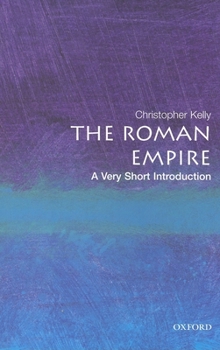The Roman Empire: A Very Short Introduction
(Part of the Very Short Introductions (#150) Series, Oxford's Very Short Introductions series Series, and Very Short Introductions (#150) Series)
Select Format
Select Condition 
Book Overview
The Roman Empire was a remarkable achievement. It had a population of sixty million people spread across lands encircling the Mediterranean and stretching from northern England to the sun-baked banks of the Euphrates, and from the Rhine to the North African coast. It was, above all else, an empire of force--employing a mixture of violence, suppression, order, and tactical use of power to develop an astonishingly uniform culture. Here, historian...
Format:Paperback
Language:English
ISBN:0192803913
ISBN13:9780192803917
Release Date:September 2006
Publisher:Oxford University Press, USA
Length:176 Pages
Weight:0.30 lbs.
Dimensions:0.4" x 4.4" x 6.9"
Customer Reviews
5 ratings
Slim but powerful Introduction
Published by Thriftbooks.com User , 14 years ago
This excellent introduction to the Roman Empire is succinct and selective rather than superficial. Its compass ranges from the iconography of the Imperial cult to contemporary perceptions of Rome in the cinema. Far from being a conventional, political history centred on the Roman elite, Kelly is most impressive when trying to recreate the ordinary lives of the silent and all but invisible majority, who have left no historical trace and only the faintest of impressions in the archaeological record. He is especially interesting and perceptive when writing about elusive topics like population studies within the Empire. Hard evidence on such matters is, naturally, very scant. Kelly uses statistical models and contemporary demographic studies of the developing world to reach his conclusions, some of which are startling - for example, the life expectancy at birth for emperors who died from natural causes between the 1st and 7th centuries: 26.3 years (no greater, therefore, than the life expectancy of people in much poorer and less privileged social groups). This slim volume manages to be authoritative, concise and thought-provoking. Anyone wanting to investigate further, meanwhile, can make good use of its extensive bibliography.
Conclse, compelling, and clear
Published by Thriftbooks.com User , 16 years ago
Written in a clear, compelling style, the author chronicles the rise of Rome and reflects upon the purposes, achievements, and costs of empire. The generous use of appropriate illustrations, concise summaries of long wars, and poignant profiles engage and inform. Kelly's details the brutal expansion of the empire, highlighting the suppression of dissent and rebellion. The precarious and complex role of conquered elites' role in the Roman Empire seems particularly strong. Likewise, the final chapter (Rome Revisited) surprised and satisfied with brief overviews of how British historians looked at the ancient Roman empire and their own empire. The author also surveys the enduring appeal, for worse and for better, of ancient Roman architecture and some vivid Hollywood movies centered around intense personal struggles. Despite underplaying the importance of slavery and a too brief discussion of civil wars within ancient Rome, this thin primer remains - by far - the best introduction to ancient Rome that I've seen. This book should find a large audience among history buffs, Latin students, and college students.
Excursions through Imperial Rome
Published by Thriftbooks.com User , 16 years ago
This Very Short Introduction is blessedly free of the typos that usually infect this otherwise excellent series, and for once, the illustrations are relevant, indeed central, to the text. There is a timeline and a very useful map at the end of the book, but the text itself is not a conventional, chronological narrative of the rise of Empire. It is rather a series of essays on a selection of topics, covering the period from Augustus to Commodus, that is, from around 30 BC to about AD 190. These excursions through aspects of the subject are concerned almost as much with how history is rewritten and reinterpreted as it is with the actual facts of history. There is an emphasis on architecture, particularly as an expression of social status and political ideology, an emphasis that will suit the taste of some readers more than others. The prose is clear and very readable, with the occasional topical, colloquial flourish ("The Empire writes back", "Through the keyhole") which can seem somewhat forced. Authoritative and illuminating, this little book is an essential addition to the reading list of anyone interested in ancient history.
Lives up to billing
Published by Thriftbooks.com User , 17 years ago
It is indeed very short, and quite pleasant to read. No doubt the author might have selected other topics from the vast field of possibilities, but in the spirit of reviewing the book he wrote rather than some other that he might possibly have written I must rate this quite highly. He manages a balance between political and social history, with a dollop of economic history as well, and adds a coda about the uses to which Roman history is put in the modern world, including commentary about films.
Outlines Debates within the Empire, Engenders a Realistic Understanding of It
Published by Thriftbooks.com User , 17 years ago
The author highlights some distinguishing aspects of the Roman Empire that are quite interesting. Among these: the bureaucracy that governed the huge geographic area of the Empire was astonishingly small, compared to later empires. The chapter on Christians is quite interesting, particularly the "martyr complex" of the early communities of the faithful and their belief that the world's end was imminent. There is a good outline of debates within the Roman empire at the time, about how civilized an empire that used brutal means to establish and maintain its authority really was.




